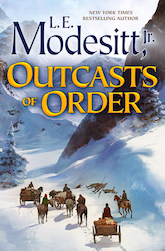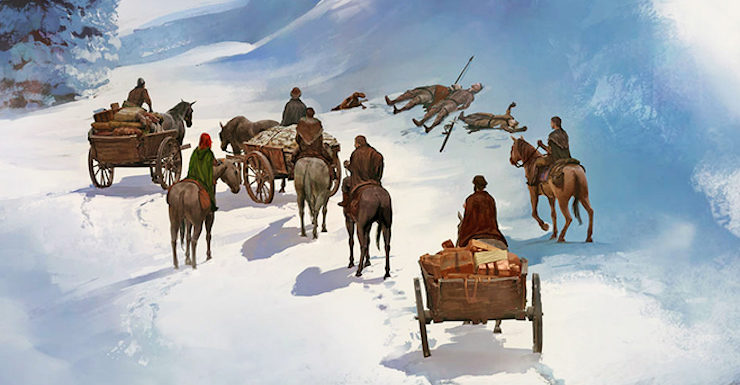When I wrote The Magic of Recluce, I didn’t intend to write a series. In fact, I hadn’t thought about it one way or another. I wrote the book because I wanted to prove a point: that a good fantasy could be realistic without losing the fantasy element. The book was so experimental that I never even told David Hartwell, who had been my editor from the beginning, that I was writing it. So receiving the manuscript was a surprise to him as well. The fact that, after reading it, he wanted to publish it… and, especially, that he wanted another book, was a shock to me.
My initial intent had been simply to do several things that most fantasy writers at the time (1989) weren’t doing: (1) to come up with a logical magic system that wasn’t a rehash of folk magic or what had been done before; (2) to make that magic an integral part of a workable socio-economic system; (3) to portray a different government/society that wasn’t a historical or present-day copy of a system in our world; and (4) to portray a world with a real and diverse history that hopefully was more than a canvas backdrop or the equivalent of a cinematic matte scenery.
One of the economic innovations that I introduced was so basic that I’m still surprised that it really hadn’t been done before, or certainly not often, was that everyone in the world of Recluce has a real job, and that their lives revolve around their job… and not around the magic system or prophecies or quests. The “real-job” aspect of the book was based on another realization about a fundamental aspect of human nature—that human beings are essentially tool-users who like entertainment. Almost no human device or system lasts if we can’t use it in some practical matter or if it doesn’t entertain… and over time make money with it.
As basic as these “realities” are to human societies, it remains somewhat of a surprise to me that, even now, some twenty-eight or so years later, that so few fantasies have a true occupational basis to the lives of their characters, especially given how integral work is and has been to every human society above the hunter-gatherer level.
Because I had envisioned the world of Recluce as a place with a history even when I’d only thought of writing one book, it wasn’t that difficult to write more books, but, there were occasional glitches, such as the fact that there never was a country named Pantera, or any Panterans, which I covered by some creative mythmaking later… and in one place in Magi’i of Cyador, I mentioned the Emperor of Hamor centuries before there actually was one.
Buy the Book


Outcasts of Order
There’s also been a great deal of conversation about “diversity” in fiction in recent years, which has been good and helpful to the F&SF genres, but a great deal of fantasy tends to lack other kinds of diversity, such as diversity in forms of government, and the interplay of the politics of diverse cultures and forms of government. In the world of Recluce, there are lands governed by trader’s councils, lands governed by chaos wizards, hereditary monarchies, military matriarchies, and even an emperor or two, and an empress. And cultural and political strife arises more out of these diversities than out of the differences between order and chaos magic. Yet that’s been another source of surprise to me, because there’s often been more of a focus by readers and reviewers on the difference in magic users than upon the fact that, in the world of Recluce, magic is a tool, and while the type of tool does influence the user, the motivations of the user determine more about what happens than do the tools used.
Along the way, there have been some surprises with every Recluce book, but not of the same magnitude as with The Magic of Recluce, and the latest—Outcasts of Order—had a few as well. Well… I did discover that Beltur has absolutely no desire to be a hero, and that the entire idea is repugnant to him… and that there’s far more to a certain healer than she or anyone else might have imagined. As for why and what… you’ll have to read the three books to find out.
And yes, the sequel to Outcasts of Order is finished. It’s called The Mage-Fire War, and it will be out about a year from now, and for some that might be another surprise.
L. E. Modesitt, Jr., is the bestselling author of the fantasy series The Saga of Recluce, Corean Chronicles, the Spellsong Cycle, and the Imager Portfolio. His science fiction includes Adiamante, the Ecolitan novels, the Forever Hero Trilogy, and Archform: Beauty. Besides a writer, Modesitt has been a U.S. Navy pilot, a director of research for a political campaign, legislative assistant and staff director for a U.S. Congressman, Director of Legislation and Congressional Relations for the U.S. Environmental Protection Agency, a consultant on environmental, regulatory, and communications issues, and a college lecturer. He lives in Cedar City, Utah.










